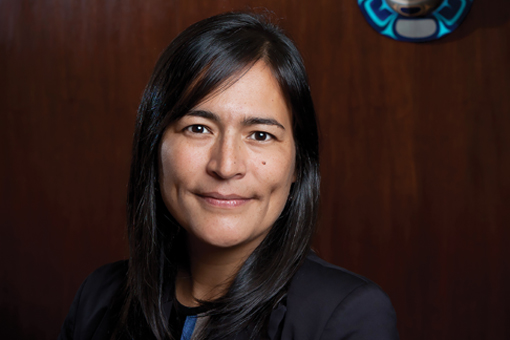Michèle Audette, president of the Native Women’s Association of Canada (NWAC), knows what it means to be invisible. Although she is a native Innu speaker, born in the Innu community of Mani Utenam in Québec, Audette was not granted Indigenous status when she was born because her mother had married a non-Native. At the time, Canada’s Indian Act—portions of which were repealed in 1985—removed official Aboriginal status not only from those who married non-Aboriginals, but from their children as well. Perhaps the only notable achievement of the law was that it sparked an activist career that transformed Audette from an “invisible” young woman into one of Canada’s most high-profile Indigenous leaders.
Audette was just 16 when she volunteered at the Native Friendship Centre of Montreal (NFCM) to work for justice for Canada’s First Nations women. Now 41 and the mother of five, her commitment to Aboriginal rights has taken her from grassroots activism to the halls of power.
By 1998, at the age of 27, she was elected one of the youngest presidents of Québec Native Women (QNW), one of NWAC’s 13 member organizations. Between 2004 and 2009, she served as deputy minister in the provincial Secretariat of the Status of Women under then-Québec Premier Jean Charest. After her stint in government, she returned to nonprofit work and in 2012 was elected president of NWAC.
Along the way, Audette gathered a string of honors and national recognitions for her work, including the Québec YWCA’s Femme de Mérite (Woman of Distinction) award. But the honors are not what Audette considers her greatest achievement.
In 2010, galvanized by the fact that her oldest son had still not been granted Aboriginal status under Canadian law because Audette’s mother did not register herself as Native in 1985, Audette organized a 500-kilometer (311-mile) march from Wendake, Québec to the Canadian Parliament in Ottawa, Ontario to protest the government’s treatment of Indigenous women and their children. She believes that, in part because of the march, the heritage of her son and 45,000 other Canadians was finally recognized the following year, when a new amendment to the Indian Act granted Aboriginal status to the descendants of women who had married non-Indigenous men.
Audette’s next goal was just as ambitious. Under her auspices, NWAC launched a campaign to help the families of murdered or missing Indigenous Canadian women. Through a five-year social media campaign, NWAC identified at least 582 women who had disappeared or been killed since 2008, estimating that as many as 2,000 women have been victimized over the past 30 years.
Audette blames racism for the deaths. She recalls the case of a woman who was abducted, raped, beaten, and left for dead in a ditch in December: “When she met with the police, the woman told them, ‘Those men told me that I wasn’t the first Aboriginal woman to be raped or beaten, and I won’t be the last one.’”
During 2012, NWAC led 180 vigils for the families of the victims that attracted world attention. In collaboration with NWAC, the National Centre for Missing Persons and Unidentified Remains of the Royal Canadian Mounted Police launched an online public database of missing persons and unidentified remains. Indigenous advocates worry that because the database does not track ethnicity, the number of Aboriginal women who have been murdered or disappeared will be lost in the larger picture of murdered Canadian women. According to Statistics Canada, Aboriginal Canadian women are 3.5 percent more likely to be attacked by a stranger than other Canadian women.
Audette doesn’t know what her next campaign will be, but she says the motivating force hasn’t changed from the days when she was an angry young activist. “The biggest challenge,” says Audette, “is reminding the federal government it has a legal responsibility toward Aboriginal people.”






